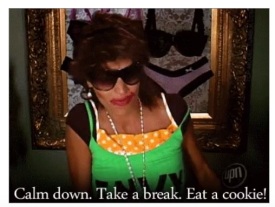The struggle is real. That popular saying deems true for writers struggling with “Writer’s Block.” I have some articles and stories that I’ve never finished writing, all because of this phenomenon. I’ve always wondered how other writers tackle this issue. Now that I’m thinking about publishing a book, I am exploring how authors keep writing, especially, when they feel like they’re in that “awkward state.” It’s an uncomfortable place for writers to be in when they feel like their hands keep reaching for the “pen” and their mind has already put it down. For some insight, I read an article titled “Have Trouble Getting That Book Done? Try Doing Less” by Ginger Moran on Jane Friedman’s blog.
Here’s what I think about the tips that she provides:
Tip 1: “Break that task down into small steps.”
I agree with this tip. Sometimes, one of the scary and overwhelming parts about writing is recognizing how much needs to be done. In fact, recognizing page limits can be a trigger for writer’s block as a writer (or college student) tries to think of subject matter that will help them to fulfill the page requirement. I’d say to think about the small picture (the content) first and then think about the bigger picture (the page requirement). When I’ve broken down the process of writing papers by writing a paragraph a day, I have been able to write more easily in one session. Authors could write a chapter or a few paragraphs a day to make writing more manageable.
Tip 2: “Exercise self-care.

Yes, this is so important to remember. The lyrics of Illa J’s song “All Good” is reminding me now that a part of self-care is relaxing your mind and having positive energy about the process. By taking breaks (to eat and to do other tasks that they enjoy) like Moran suggests in this article, writers can recharge themselves and continue writing after it has become difficult.
Tip 3: “Know that writing happens in separate sections.”
This is true. The first step mentioned is conceiving the idea. Next, writers create the first draft. Then, they craft the draft by editing. Finally, writers can share and market their book through publishing. I believe that breaking writing into sections can help writers to be focused. I have found that whenever I edit as I write, the process has been very challenging. As I did this, I found myself questioning the idea that I conceived in the first place. Instead, I should have given myself a break from the writing with some time to reflect and then edit my work. It was less stressful for me to edit my work after a draft had been created. Maybe multitasking is harder for some writers?

This article reminded me to take the process of writing in small, manageable steps. I can appreciate Brenda Ueland’s quote in Moran’s article too: “I learned that you should feel when writing, not like Lord Byron on a mountain top, but like a child stringing beads in kindergarten—happy, absorbed and quietly putting one bead on after another.” Even though writing can be challenging at times, the goal is to make the process less challenging and more approachable.
Have you experienced Writer’s Block? Why? How have you dealt with it?
Please leave a comment below.

Cool post this week and interesting topic. At one of my jobs, I have been working on writing lyrics with a writer and understand that some days words flow better than others. I know for me, nothing really helps besides time – but for others, there might be shortcuts to getting rid of writer’s block.
LikeLike
Thanks for your comment. Time is a good way to fix it; time to reflect on what we’ve written and time to keep thinking.
LikeLike
I couldn’t have thought of a better time to read your post, as I’m currently struggling with writing my next blog post. The first tip is a great suggestion, but not so much for procrastinators like me lol. Once I better manage my time, I think self-care is a great way to help ease writer’s block. Your last tip was the one that I took away the most from. I try editing while I write too, mostly because I’m too lazy to actually have a rough draft and I just want it to be perfect the first time. This isn’t at all the best way to have good writing and something I definitely want to improve on moving forward. Enjoyed your post!
LikeLiked by 1 person
This is a very helpful post. One of my friends told me: Just write 20 mins a day – not matter what it is, just 20 mins. This has been helpful for me. Obviously, some days I go for much longer and others, I am waiting for the timer to go off!
LikeLiked by 1 person
That’s great advice!
LikeLike